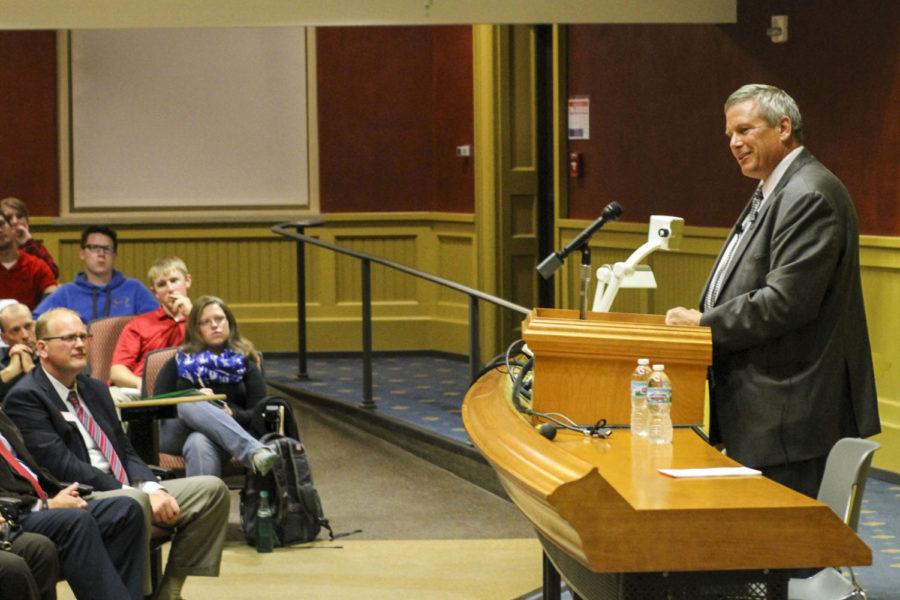Secretary of Agriculture Bill Northey speaks at Iowa State
October 1, 2014
Bill Northey can recall a touching experience during his first year presenting at the Heritage and Century Farm Awards.
It was a scorching hot day during the annual program at the Iowa State Fair that was coming to an end. An older, burly gentleman who looked to be in his 80’s approached Northey across the stage.
The man, with tears running down his cheeks, explained to Northey how he had been waiting 15 years for that specific day. He was proud to be accompanied by a family of five generations of farmers to receive the award.
Farmers may be able to easily capture the excitement of their crop yields and new technological innovations, but it’s family and the story of Iowa’s farmers that Bill Northey thinks is truly the exceptional part of working in today’s world of agriculture.
“It was incredible hearing how 344 families received awards [at the Heritage and Century Farm Awards] for keeping the farm in the family for 100 years. It gives a very positive outlook for the future of agriculture,” said Catherine Hayes, sophomore in agricultural business.
Northey, Iowa’s current Secretary of Agriculture, gave a presentation titled “The Future of Iowa’s Farm Families” on Tuesday night in the Dolezal Auditorium in Curtiss Hall. In his appearance, Northey talked about the importance of farm production in Iowa as well as what the future holds for those looking to get into agriculture.
Northey has been the Republican Iowa Secretary of Agriculture since 2007, and was reelected in 2010. Northey graduated from Iowa State University with an undergraduate degree in Agricultural Business in 1981. He received a master’s degree in business administration from Southwest Minnesota State University in 2004.
“All the technologies we take for granted can be traced back to agriculture,” Northey said. “People who walked these very streets were very influential to agriculture.”
Northey told stories that helped explain Iowa’s role in agriculture in the past. In one of these stories, Northey said after Japan had experienced typhoons, Iowan farmers put pigs on an airplane and sent them to reach out. Today’s relationship between United States and Japan can be traced back to that act.
In another story, Northey explained how Iowa was settled in the mid to late 1800s as folks came hoping to produce food for their families. The excess production helped neighboring cities, such as St. Louis and Chicago, grow in population.
“[Iowa] is one of the most special places in the world, and we should not forget this just because it’s so familiar.” Northey said.
Northey presented some interesting facts to convey this idea to the audience. He said after this year, the state of Iowa will have produced more soybeans than every country in the world, with the exception of the whole United States, Argentina, China and Brazil. The same can be said about corn, with the exception of Brazil.
People from many other countries come to Iowa all year long to learn about agriculture and take our ideas back with them. China is just one of many countries, as Northey said, that have drawn inspiration from innovation in Iowa.
Countries like China buy 60 percent of all the soybeans traded in the world today. Fifteen years ago, they were not involved in the world of agriculture. The Chinese government is expected to invest around $450 billion in agricultural research in the next 10 years. Iowa’s investments will total up to $2 billion.
“The challenge is to look at that and to learn and see what other changes in the world are occurring,” Northey said. “What other demands and opportunities are present in that part of the world? Are there are opportunities in Africa, India and other markets?”
Northey said for the future it will be important to think about what direction technological innovations in agriculture are heading in, and also where the world needs all of Iowa’s excess production.
Natalina Sents, a junior in agricultural business, was pleased with the lecture.
“It was really inspiring to me as someone who’s hoping to be in agriculture and advocate for it in the future,” Sents said. “The people are definitely why I’m in it. Everybody has a story and agriculture is a part of it.”
Northey offered some advice for potential first-generation farmers. He said it may be difficult but not impossible.
“There isn’t a magic bullet for how to do it,” Northey said. “It depends what you are interested in and can do. It’s what you believe is different, and will cause you to be optimistic to work everyday to make it happen.”

















